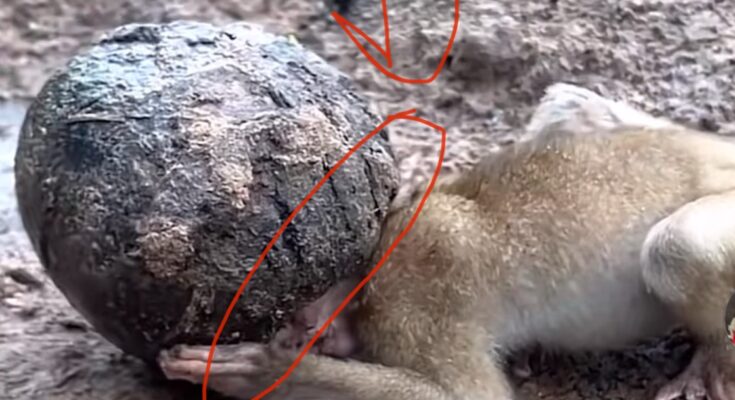In a heart-stopping incident that has captured the attention and compassion of animal lovers worldwide, a baby monkey narrowly escaped death after getting its head trapped inside a discarded coconut shell. The shocking event is a grim reminder of how human negligence and littering can have devastating effects on wildlife.
The young monkey, believed to be only a few months old, was spotted by locals struggling frantically in the underbrush near a village edge. Witnesses say the animal appeared to be gasping and weak, with its tiny body trembling as it tried to free itself from the heavy, hard shell that encased its head. The coconut had a jagged opening — just wide enough for the curious baby to slip its head through while foraging for food, but too narrow for it to pull back out.
Rescue workers and villagers acted quickly once they realized the monkey was in distress. It took nearly thirty minutes of careful effort to cut through the thick coconut without causing injury to the animal. When the baby was finally freed, it was visibly exhausted, dehydrated, and frightened. After receiving water and a quick check-up by a local veterinarian, the monkey slowly regained strength and was later reunited with its troop.
While the story had a happy ending, it sheds light on a much larger issue — the dangerous consequences of human waste in natural habitats. Monkeys, like many other wild animals, are curious by nature. They are drawn to leftovers, packaging, and discarded containers that can become deadly traps. From glass bottles to plastic jars and metal cans, litter left behind by humans often turns into hazards for unsuspecting wildlife.
Environmentalists have used this incident to call for greater awareness and responsibility among communities living near forests and wildlife areas. “A single act of carelessness, like tossing away a coconut shell or plastic cup, can endanger an animal’s life,” said a local wildlife officer. “We need to educate people, especially in rural and tourist areas, to dispose of waste properly and understand that our actions directly affect the animals we share our planet with.”
Social media has since turned the rescued baby monkey into a symbol of survival and a reminder of compassion. Photos of the tiny creature’s rescue went viral, inspiring many to take small but meaningful steps — like cleaning up after picnics, supporting recycling efforts, and reporting animals in distress.
This near-tragic story of a baby monkey and a coconut shell is a powerful testament to the fragility of nature and the responsibility humans bear in protecting it. The next time we’re tempted to leave something behind, it’s worth remembering that what seems like harmless litter could become a deadly trap for a curious animal fighting for its life.



